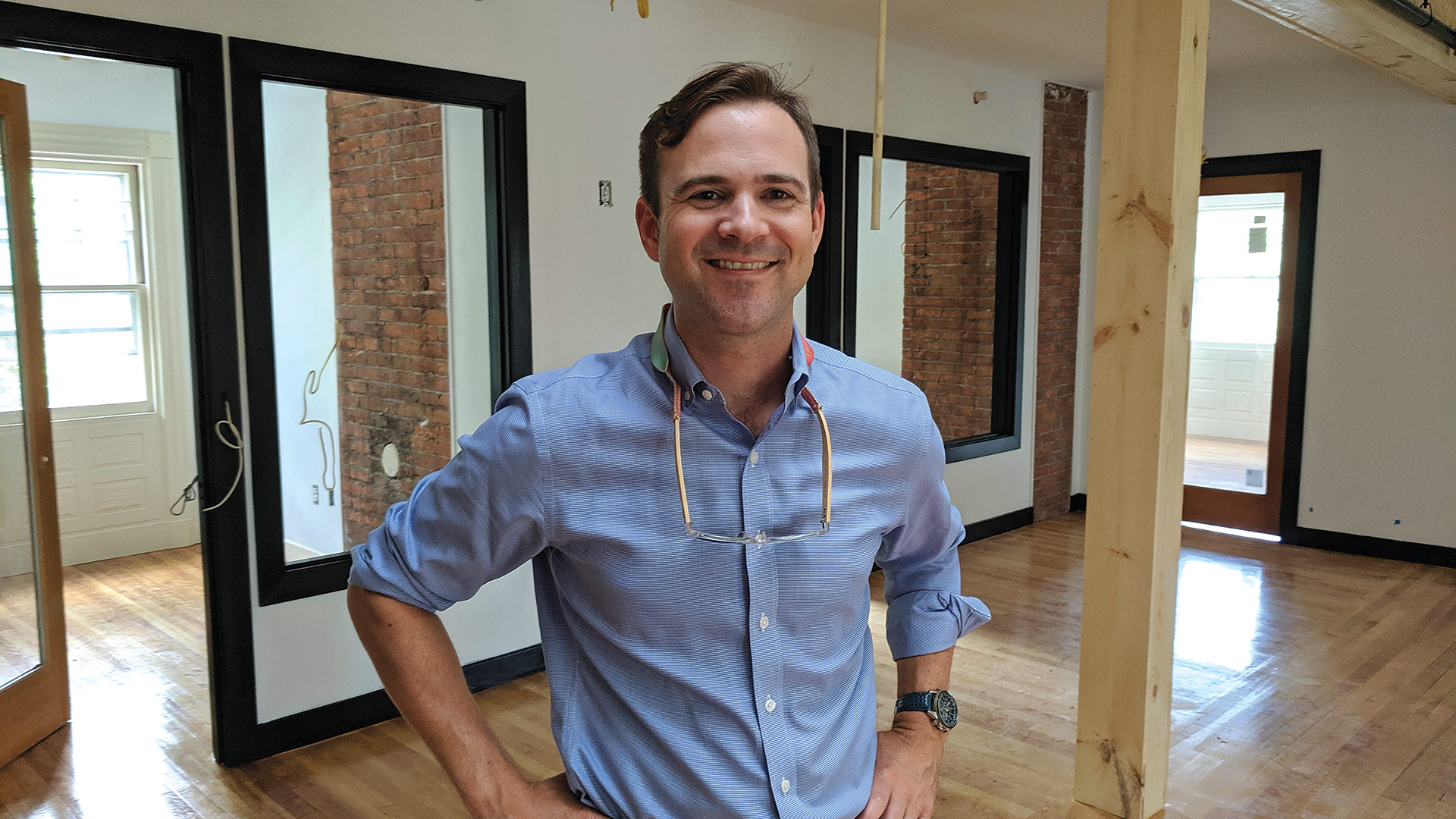Cannabis Ink.

Michael Kusek
Suffice it to say the cannabis industry in Massachusetts is growing and changing at a torrid pace, and it will continue at this speed for some time to come. There are myriad aspects to this sector, from the many different kinds of businesses within it to the dizzying number of products now on the shelves. Michael Kusek, a veteran journalist, has now made it his business — literally and figuratively — to help the public understand all it needs to know.
$20 billion.
That’s the number Michael Kusek offered — somewhat reluctantly and after some hemming and hawing — when he was asked to try to guesstimate how big the still-fledgling cannabis industry might become in the Bay State.
He was reluctant because no one really knows the answer to that question at this point, and they may not for some time. And Kusek knows that better than anyone, which is why he was asked in the first place.
Indeed, Kusek has established himself as the pre-eminent journalist in these parts when it comes to the broad, as in very broad, subject of cannabis, status earned by starting a publication devoted entirely to that subject.
It’s called A Different Leaf, with the subtitle A Journal of Cannabis Culture, and it hit the streets — that’s an industry term — just a few weeks ago. This will be a quarterly publication, sticker price $7 ($10 in Canada), and it now carries the tagline “Bringing You the Best of Cannabis in Massachusetts.”
It is, as Kusek will tell you himself, just the latest of many entrepreneurial endeavors rooted in (yes, that will be the first of many puns you’ll read) the cannabis industry. And he obviously believes it will be a success.
The first issue provides ample evidence of the fact that this subject matter, and this industry, are now quite broad, and Kusek and his team will have plenty to write about. Story headlines include these:
• “Tale of Two Cities: Cannabis may be legal statewide, but what gives with certain cities?”;
• The Grandfather of Cannabis: If you want to learn Massachusetts cannabis history, start with Lester Grinspoon”;
• “And Justice for All: The cannabis industry holds huge promise for new jobs, but who is getting to start companies?”;
• “The Women of Cannabis: These women are shaping the industry”;
• “Going Gourmet with Cannabis: Chef David Yusefzadah’s gourmet take on cannabis edibles and fine dining”; and even
• “Sex & Cannabis: Strategies for combining sex and cannabis.”
To put out such a publication credibly, Kusek has obviously had to set himself up as an authority on this subject, something few other individuals can claim. And as BusinessWest talked with him, he certainly spoke the part.

The cover of the first issue of A Different Leaf, featuring a piggy bank with the word ‘weed’ on it, sends a strong message about the industry and its potential impact in and on the Bay State.
When asked about the pace of businesses opening and some of the latest additions to the landscape, he rattled off the names of new dispensaries in far corners of the state. He knows which communities have voted to ban such enterprises, and he’s even put together a color-coded map to show people the breakdown, a map he says is quite revealing and shows a different twist on business in the Bay State when it comes to east-west dynamics.
“Start on the Cape, and at Provincetown and work your way west — from Provincetown to the elbow, all legal; from the elbow to the armpit, all banned,” he explained. “You get to the South Coast, there’s a smattering, a few banned, and then you get to the suburbs of Boston: the majority of ‘banneds’ in the state form a giant red ‘C’ around the city of Boston, which is this green dot right in the middle.
“That ‘C’ ends at Route 495,” he went on. “And from there to the Berkshires and the New York border, it’s all green with the exception of a handful of towns. So in a state where the gravitational pull of Boston for industry is so strong, the cannabis industry is 495 west.”
As for that question about how big the industry might get in the Bay State, Kusek offered that number, $20 billion — the high end, he acknowledged — but quickly added a caveat.
“In a state where the gravitational pull of Boston for industry is so strong, the cannabis industry is 495 west.”
“It all depends on what our neighbors do,” he explained, noting that, while Massachusetts is alone in the Northeast when it comes to states that have legalized cannabis and also have mechanisms in place for selling it, this probably won’t be the case for long.
As for how big the playing field might get in terms of locations and how many might eventually become too many, Kusek said the market will essentially determine this.
“Right now, there are only 20 businesses in the state, and they’re all pretty much opening their doors to a reasonably healthy amount of traffic,” he said. “That’s going to change over time.”
For this issue, BusinessWest talked at length with Kusek about his new publication, but mostly about the business of cannabis what dimensions in might take in the years to come and how this ultra-intriguing development will change life in the Bay State.
Stirring the Pot
“I didn’t smoke pot until college, when one night my freshman roommate and a friend sparked up my first joint. Two things happened: I didn’t get high, but my fear of cannabis evaporated. This thing I had been taught would ruin my life didn’t seem frightening — and from there it became part of my social life.”
That’s how Kusek began his “From the Editor” piece that introduced his magazine to the reader on page 3 of the first edition. He would go on to talk about how he found that cannabis helped him sleep better, and a few sentences later, he hit at the heart of what this venture is all about.
“Much of the cannabis media is aimed at people who are knowledgeable about cannabis, work in the industry, and/or are in their 20s. Where was the magazine for the older occasional user looking to expand their horizon now that legalization is real?” he wrote, adding that A Different Leaf is the answer to that question.

This map, indicating which communities have banned cannabis businesses (red) and which ones haven’t (green), shows how Western and Central Mass. are the big players in this emerging industry.
It is, indeed, intended for those who, like Kusek in his freshman dorm room, may have overcome their fear of cannabis (that’s may) but still have questions about this product that until very recently was illegal in this state. And Kusek backed up his assumptions that there are many, many people in this category with some anecdotes.
He mentioned a woman in her 70s who was wondering, as he did, if cannabis might help her sleep better without having to resort to sleeping pills, while a younger man asked him if cannabis might provide some relief for his aching knees.
These are the kinds of questions, coupled with growing certainty that a publication targeted to the people who were asking them would be viable and profitable, that prompted Kusek to greenlight his media venture.
Actually, it’s his latest media venture.
Indeed, Kusek, who told BusinessWest he has ink in his veins, has an extensive background in journalism, a second career launched after years of working as a development professional left him looking for something new and different.
“People started running in the other direction when they saw me,” he joked, referring to the latter stages of work raising money for various institutions, including the Springfield Symphony Orchestra.
He changed course and went into public relations and communications work for several years, and while doing that was recruited to handle marketing for the Valley Advocate.
“I had been on the outside of media for a number of years, but this was my first professional stint inside the media, and I really liked it,” he said. “I thought I liked the journalism side of it, which I do; I’m fascinated by it. But what I really began to get interested in was the business side of media.”
He left the Advocate in 2008 with designs to start an arts magazine for New England, but quickly surmised that 2008, the climax of the Great Recession, wasn’t a good time to start any business, so he put those plans on ice and went back into communications.
When times were better, the start of 2014, he launched Take, an arts and culture magazine that, while well-received by readers and crtitics, “never found its niche with advertisers,” said Kusek.
By 2017, Take was winding down, and Kusek was again looking for another challenge. He found one, eventually, in cannabis and a need he identified to create something for older, as in over 50, audiences.
There is a need to stress eventually, because he Kusek certainly didn’t rush into this. He said he did his homework, in the form of extensive research concerning both the emerging industry and the press devoted to it.
“I went to the Barnes & Noble in Hadley and purchased every cannabis magazine they had on the stands, and then I drove to the one in the Northampton and did the same thing,” he recalled, adding that, by the time he was done, he had quite a pile.
He would break these publications down into three categories — the ‘legacy’ magazines such as the well-known High Times, a huge number of business-to-business magazines, and a smaller number of titles he labeled ‘bro’ magazines, aimed at a decidedly younger audience.
What was missing from this pile, he determined, was something devoted to those 50 and over and not exactly experts on this subject.
Growing Like Weed
He describes what he came up with to fill that void this way: “Wine Spectator meets High Times for the 45-to-50-plus crowd,” an intriguing combination editorially that he was reasonably certain would be well-received.
But he knew that solid content without advertising support wasn’t going to get him very far. So he said his next step was to Google ‘cannabis and advertising,’ and the first thing that came up was a Boston Globe article quoting sources talking about how businesses within the cannabis industry were struggling to find media outlets to take their advertising dollars.
“I said, ‘I can take their advertising dollars,’” he told BusinessWest, adding that laws prohibit such companies from advertising on the Google Display Network, Facebook, and other platforms. “I thought there was some space there from a revenue standpoint.”
The first issue gives some evidence of this space, with ads from a number of recreational and medical dispensaries, agencies such as the Mass. Recreational Consumer Council, a hydroponics outfit, and businesses that support the industry, such as Brigade, a Hadley-based company that has helped a number of cannabis-related businesses with branding.
“I think the biggest threat to what could be a really interesting and dynamic industry is if big money rolls over the small businesses. You have some large multi-state operators that could, with their capital, become like Dunkin, with locations on every corner; they have enough capital to make that happen.”
With enough of these advertisers secured — and it took some time to secure them — Kusek decided to let the presses roll. He’s optimistic about the venture and predicts that, as the industry grows and more businesses across the sector open their doors and then desire to market their goods and services, he will have a sustainable business model. And looking down the road, he said the venture could certainly be expanded into other states and parts of the country as legalization continues to spread.
While watching for business opportunities, Kusek is also watching the industry as it grows and evolves in the Bay State. And while watching, he noted that things are certainly happening quickly and the picture is changing almost every day, something he finds both intriguing and challenging as a journalist.
“What’s interesting about being in the industry as a relative newcomer is how dynamic it is and how it changes week to week and month to month,” he noted. “There are always new businesses coming into the pipeline, and there’s new people coming on to the scene. As a journalist sort of keeping an eye on that industry, it’s a lot — there’s a lot of info coming in.
“In this business, a week feels like a month, and a month feels like a year because things move so quickly,” he went on. “We’re in a state where highway improvements are measured in 20- or 30-year increments, so the idea that we have a state agency that got an industry up and running in two years is pretty amazing.”
Also intriguing is the high level of transparency in this new industry, something Kusek said is unique within state government — “you don’t see the head of the DMV writing any open letters right now” — which he believes is a byproduct of expectations.
“This is an industry that grew out of a political movement,” he explained. “Legalization was a political movement, so you have activists, even though it’s legal, continue to pay attention. You have patient activists continue to pay attention to the medical program to make sure it’s serving people really, really well.
“And that’s very different from saying, ‘we’re going to expand the alcohol program, and there are a bunch of activists making sure it’s done right,’” he continued. “Lobbyists, yes, but activists? That’s a different story, and that’s been the genesis for the openness you get from the cannabis commission. If you want to follow how this industry grows, you can look in and see how the sausage is made.”
Stirring the Pot
Kusek said he has been struck by, and quite impressed by, the entrepreneurs now doing business across this broad sector.
They are pioneers of sorts, he said, charting new territory in a fledgling industry, and they’re also survivors in what has become a rugged contest to gain a license and open the doors to a business, an assignment far more difficult than it might look to the casual observer.
“I spend a lot of time with people in this industry, and I have rarely met harder-working people,” he told BusinessWest. “The idea of these people being lazy stoners is far from the truth. These people work around the clock to make their businesses work, and you have to give them credit for that, because it’s not easy.
“They got a lot of curveballs thrown at them,” he added, referring to, among other things, the often complex and taxing host-community agreements and the many hurdles that must be cleared on the way to getting a license. “These people just keep slogging forward, and it’s pretty impressive.”
Elaborating, he said it takes at least a year to attain a license, and there are significant upfront costs and expenses to be incurred before one can earn a nickel.
“One of the challenges with opening a cannabis business is that the license is attached to an address,” he explained. “So once you get your host-community agreement and start the application process, you have to buy or rent a building. And it can take months before you get that license; there’s a pretty good burn rate on your capital before you earn any money.”
This hard reality was one of the factors that delayed the first issue of A Different Leaf, he said, adding that many of the businesses he was counting on to support that venture were still waiting to secure a license.
When asked to look down the road and project what the scene might look like in a year or two — or 10 — Kusek reiterated that this is difficult because Massachusetts certainly won’t be the only state in the Northeast doing this for much longer.
At present, large numbers of people are crossing over the borders to the Bay State to buy cannabis products, he said, adding that soon, a relative term to be sure, they may not have to.
When asked about what might go wrong as the industry expands and broadens its influence, Kusek this, too, is difficult to project.
“I think the biggest threat to what could be a really interesting and dynamic industry is if big money rolls over the small businesses,” he explained. “You have some large, multi-state operators that could, with their capital, become like Dunkin’, with locations on every corner; they have enough capital to make that happen.”
At present, the Cannabis Control Commission has governors in place to limit such a threat, he added quickly, noting that entities are currently limited to three stores. But moving forward, the state needs to keep such measures in place to prevent monopolies from developing.
Meanwhile, there is the state’s Social Equity Program, designed to provide a pathway for individuals and businesses in communities of “disproportionate impact” to enter the adult-use cannabis marketplace. That program is laudable, said Kusek, and it provides opportunities for certain demographic populations, but these individuals face stern challenges to enter the growing cannabis marketplace.
“Overall, I think the state is doing a commendable job, from where I sit, trying to balance fostering small businesses, fostering this cadre of businesses that are applying under the Social Equity Program, with the big companies that are coming to Massachusetts,” he said. “It’s a very delicate balancing act.”
What also remains to be seen is how and to what extent the cannabis industry and players within it become part of the business community on a regional and statewide basis, he said.
“Cannabis people are thinking, ‘are we going to be welcome?’” he said. “Traditional industry organizations like AIM [Associated Industries of Massachusetts]… AIM was not in favor of legalization, but now it’s like, ‘we have this multi-billion industry on our hands — how do we make them part of our organization?’ It will be interesting to see how traditional industries embrace this.”
Give and Toke
“One thing I’ve discovered about cannabis in the last year is that it is a topic full of evolution, learning, and change.”
That’s how Kusek chose to essentially wrap up his initial message to his readers.
To some, that might seem like understatement given how the landscape has changed over the past year and how it is destined to continuing changing in the months to come.
But it also a reality.
Kusek now has a front-row seat for one of the most compelling business stories in this state’s history, and he is really enjoying both the view and the challenge of trying to capture it all.
George O’Brien can be reached at [email protected]

















 The cannabis industry is off to a fast and quite intriguing start in the Bay State, and two new categories of license have particular potential to move this sector in new directions: one for home delivery of cannabis products, and another for social-consumption establishments, or cannabis cafés.
The cannabis industry is off to a fast and quite intriguing start in the Bay State, and two new categories of license have particular potential to move this sector in new directions: one for home delivery of cannabis products, and another for social-consumption establishments, or cannabis cafés.









 Section 199A of the Tax Cuts and Jobs Act was created to level the playing field when it comes to lowering the corporate tax rate for those businesses not acting as C corporations. For most profit-seeking ventures, qualifying for the deduction is not difficult, but for rental real estate, it becomes more difficult.
Section 199A of the Tax Cuts and Jobs Act was created to level the playing field when it comes to lowering the corporate tax rate for those businesses not acting as C corporations. For most profit-seeking ventures, qualifying for the deduction is not difficult, but for rental real estate, it becomes more difficult.

